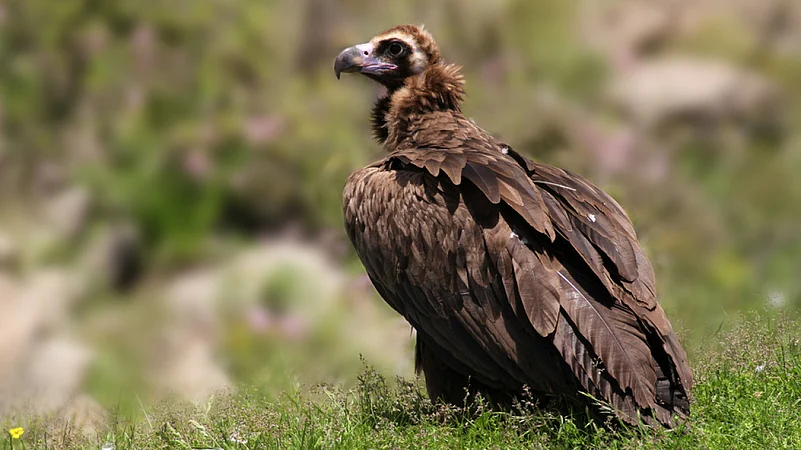Maharashtra, home to seven of the nine vulture species in India, marked International Vulture Awareness Day, celebrated on the first Saturday of September annually, with a slew of initiatives to boost numbers and ensure conservation.
A total of nine species of vultures are found in India. Out of these six species are resident (white--rumped vulture, Indian vulture, slender-billed vulture, red-headed vulture, bearded vulture and Egyptian vulture) and three species are migratory (cinereous vulture, griffon vulture and Himalayan vulture).
Once numbering 40 million, mostly white-rumped, Indian and slender-billed, the numbers saw a catastrophic fall between 1990 and 2007. As per experts, 99.9 per cent of white-rumped vultures, and 99 per cent of the Indian and slender-billed varieties died out between 1993 and 2007, while other species saw fall in numbers between 81 per cent and 90 per cent.
Experts zeroed in on diclofenac, a veterinary drug used for pain management in livestock, as the main cause of the near wipe-out of vultures, who were eating such carrion and then suffering kidney failure almost within 24 hours.
In view of this threat to vultures that brought them close to extinction, diclofenac was banned for veterinary use in India and Nepal in 2006 and in Bangladesh in 2010. Despite this ban, human-use diclofenac was being use in veterinary treatments.
This year, the Maharashtra Forest department has partnered with Ela Foundation and Sahyadri Nisarg Mitra to mark International Vulture Awareness Day through conservation, and it has also released a poster in collaboration with The Corbett Foundation.
Speaking on efforts by his department, Maharashtra Principal Chief Conservator of Forests (Wildlife) and Chief Wildlife Warden Sunil Limaye said, "For the past several years, many in-situ conservation programmes such as protecting vulture habitats, promoting vulture restaurants, satellite tagging of vultures have been undertaken."
"But these efforts need to be supported by ex-situ conservation measures such as establishing a conservation breeding centre for vultures in the state. This is also a part of the Action Plan for Vulture Conservation in India, 2020-2025 released by the Ministry of Environment, Forest and Climate Change," he said.
Limaye further said Konkan, western Maharashtra and Vidarbha regions in the state still have the requisite habitat needed to act as a long-term breeding areas for the white-rumped, Indian and Egyptian vultures, which are resident in the state.
Efforts to revive numbers and conservation are going on nationwide, with the Union government publishing an action plan for vulture conservation, as well as establishing captive breeding centres in collaboration with the forest departments and the Bombay Natural History Society in Haryana, Assam, Madhya Pradesh and West Bengal. This initiative is expected to start soon in Maharashtra as well, officials said.
Currently, as per the Maharashtra forest department, seven species have been reported from the state, comprising white-rumped vulture (critically endangered), Indian vulture (critically endangered), red-headed vulture (critically endangered), Egyptian vulture (endangered), cinereous vulture (near threatened) , Himalayan griffon (near threatened) and griffon vulture (least Concern).
Kedar Gore, director of The Corbett Foundation, told PTI the decline in population of vultures was observed since the 1980s, with diclofenac and the loss of habitat being the main causes.
"White-rumped vultures are found patchily in Thane, Raigad Ratnagiri, Sindhudurg and Raigad in Konkan as these areas have tall coconut trees, which are useful for vulture roosting and nesting. Similarly, Indian vultures are found on cliffs in Sahyadri in Western Ghats and forested hilly areas in Vidarbha landscape. There is need for national level scientific estimation of vulture population to know their movement pattern, habitat use for roosting, feeding and nesting," he said.
This will help plan effective conservation actions for the long-term protection of these ecologically important scavengers. There is a need to undertake satellite-tagging on a large-scale to monitor the movement of vultures to create plans for the entire country, he said.
"We are still learning about the limits and areas where these vultures can fly. Few satellite-tagged vultures have been observed to cross our international borders, so coordinated conservation efforts with our neighbouring countries must also be pursued," Gore added.
The Maharashtra forest department officials said proactive efforts were being taken for conservation involving monitoring of vultures and their nests, tracking movement, feeding, roosting, as well as ensuring strict implementation on the ban on use of diclofenac. The department was also creating awareness among livestock owners, they added.
A novel initiative was the creation of "vulture restaurants" in Gadchiroli, Nashik and Thane circles in the state, where carcasses free of diclofenac are provided, they said.
"Similarly, groups called 'gidhaad mitra' for local villages have been roped in for rejuvenation and conservation efforts. The project is funded under CAMPA (Compensatory Afforestation Fund Management and Planning Authority). Moreover, compensation of Rs 4,800 is paid to farmers for damage to coconuts by vultures," an official said.
He said, as per the 2020-25 action plan for vulture conservation in the country, the Maharashtra government plans to establish vulture conservation and breeding centres for white-rumped vulture and Indian vulture species in Nashik and Pune in collaboration with the BNHS, Mumbai and ELA Foundation, Pune.
(With PTI inputs)


























